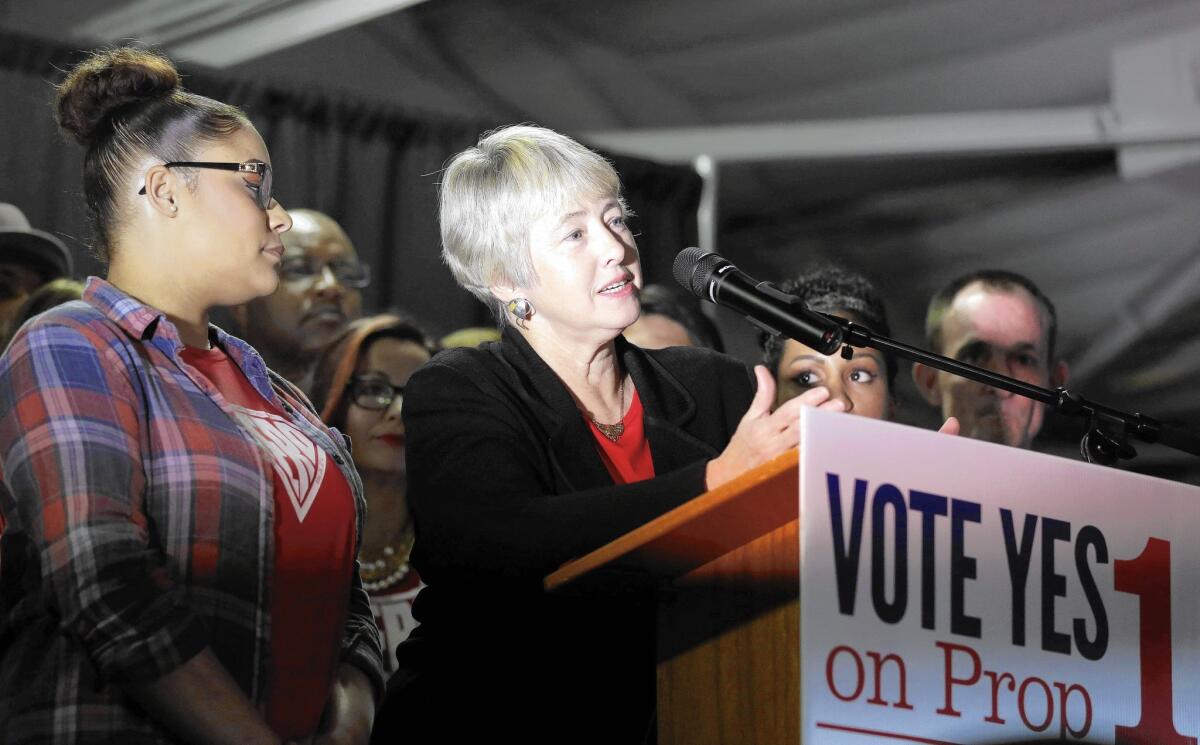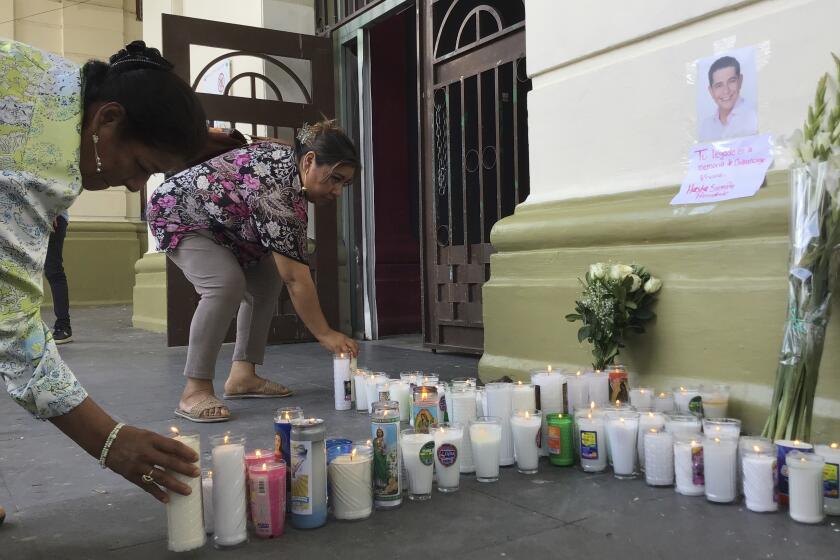Houston may revisit LGBT equal rights measure that failed at polls

Reporting from HOUSTON â A controversial citywide nondiscrimination measure overwhelmingly rejected by voters here this week may not be dead.
Voters rejected the Houston Equal Rights Ordinance 61% to 39% after a protracted 18-month legal and political battle, but it could be revived by the City Council, experts said, particularly if one of the contenders in an ongoing mayoral runoff champions the measure that would provide nondiscrimination protections for gay and transgender people.
The Democratic mayoral contender, state lawmaker Sylvester Turner, supported the ordinance and garnered 31% of the vote. His Republican opponent, Bill King, opposed the ordinance, pledging not to reintroduce it if it failed, and won 25% of the vote.
âSo as long as you have people who want to resurrect it, and I think Sylvester Turner will want to, itâs an issue the voters are going to have to consider,â said Paul Simpson, chairman of the Harris County Republican Party. âItâs clearly an issue that could come back up again. The question becomes: What would the next mayor and City Council do?â
Concerns about transgender women using womenâs bathrooms fueled a popular campaign against what opponents dubbed âthe bathroom ordinance.â
Some conservatives have floated the idea of modifying the ordinance, removing controversial protections for transgender individuals. Others oppose any efforts to revive it.
âHow many more times do those council members want to go through this when the voters have already spoken?â Simpson said. âJust listen to the citizens.â
NEWSLETTER: Get the dayâs top headlines from Times Editor Davan Maharaj >>
King, the former mayor of outlying Kemah, would not revive the ordinance, a spokesman said. âThe court systems have spoken, the voters have spoken, and as far as Bill is concerned, thatâs it,â Jim McGrath said, adding, âItâs been a horribly divisive issue for the city.â
Itâs not clear what Turner would do.
âI donât think you can read from yesterdayâs vote that people were saying yes to discrimination,â Turner said Wednesday. âItâs an opportunity for everyone to take a deep breath, continue to have a conversation, to work to build a very unified city. Weâll see what unfolds.â
Turner says he plans to work to prevent discrimination in the city, but âwhat form that will be, how you would present that, itâs way too early to say.â
The ordinance was originally passed by the City Council in May 2014, but after opponents petitioned and sued to bock it, the Texas Supreme Court ruled it had to be repealed or put to a vote.
Mayor Annise Parker, the first openly lesbian mayor of a major U.S. city, refused to modify the ordinance in the face of what she called discriminatory âfear mongeringâ and âdeliberate liesâ targeting âa little-understood minorityâ in the LGBT community.
Parker said Wednesday that she and the City Council, which approved the measure 11 to 6, may take the ordinance up again during her remaining two months in office. âThereâs a strong desire on the part of the council members who voted for it,â she said.
Parker said they could reconsider the measure in whole or in parts â for instance, employment and housing protections â but said she would not agree to exclude any of the 15 protected groups.
âWe have a responsibility to try to be thoughtful and figure out a way to bring those protections back,â she said, adding that if they donât, she hopes the next mayor does.
âThis broad and diverse coalition will continue to push the city to have these protections in place, and [ensure] that they will be fully inclusive,â said Richard Carlbom, campaign manager for Houston Unites, adding: âWe do anticipate that we will have strong support among Sylvester Turner and council members.â
Rebecca Robertson of the ACLU of Texas said the mayor or City Council could still reintroduce the ordinance, as is or with revisions.
âThereâs no legal impediment,â she said.
Doing so would cement Parkerâs legacy but imperil Turnerâs campaign by alienating African American voters he needs to win, said Brandon Rottinghaus, an associate professor of political science at the University of Houston.
But if city leaders drop the ordinance and Turner distances himself from it, Rottinghaus said, Turnerâs Republican opponent can still use it to âdrive a wedge into the African American community, which is bread and butter for the Turner campaign.â
Turner, 61, a black, Harvard-educated lawyer, has been negotiating a complicated relationship with both the African American and LGBT communities during this, his third, campaign for mayor.
Houston NAACP leaders supported the ordinance, but many other African American leaders did not, including conservative pastors who sued to stop it. And while leaders in the LGBT community backed Turner this election, they didnât in the past â he won them over by shifting his voting record and his stance on gay rights, saying it âevolved.â
âI grew up in the city. This is a very diverse city, and I donât want us to undervalue or underrepresent that,â Turner said Wednesday. âHow we move forward, that has yet to be determined.â
âWe must continue to work to make sure we are inclusive,â he said, âwith or without Proposition 1.â
Twitter: @mollyhf
ALSO:
Quentin Tarantino says police boycotts donât intimidate him: âIâm not a cop haterâ
Super volcano? The Big One in Wyoming? A huge gash in Earth has folks talking
Head of money-losing L.A. County Fair Assn. made nearly $900,000 in total compensation
More to Read
Sign up for Essential California
The most important California stories and recommendations in your inbox every morning.
You may occasionally receive promotional content from the Los Angeles Times.











